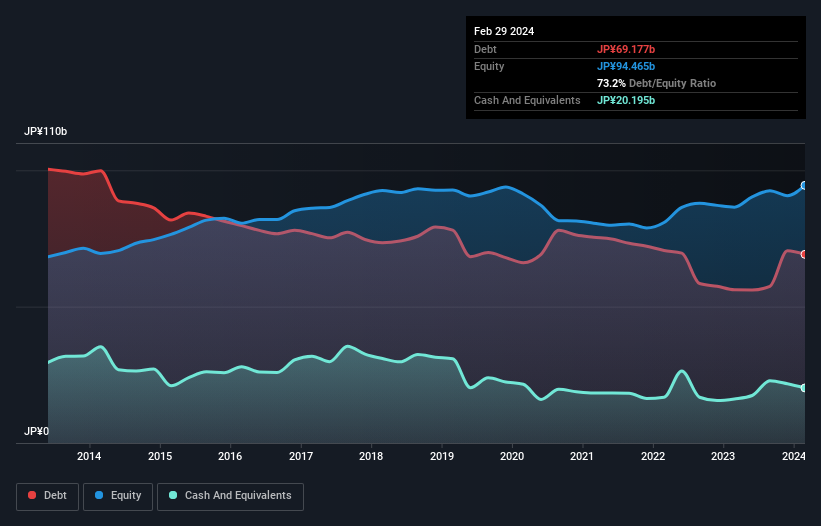Legendary fund manager Li Lu (who Charlie Munger backed) once said, 'The biggest investment risk is not the volatility of prices, but whether you will suffer a permanent loss of capital.' So it might be obvious that you need to consider debt, when you think about how risky any given stock is, because too much debt can sink a company. Importantly, Shochiku Co., Ltd. (TSE:9601) does carry debt. But the real question is whether this debt is making the company risky.
Why Does Debt Bring Risk?
Generally speaking, debt only becomes a real problem when a company can't easily pay it off, either by raising capital or with its own cash flow. Ultimately, if the company can't fulfill its legal obligations to repay debt, shareholders could walk away with nothing. While that is not too common, we often do see indebted companies permanently diluting shareholders because lenders force them to raise capital at a distressed price. Of course, debt can be an important tool in businesses, particularly capital heavy businesses. When we examine debt levels, we first consider both cash and debt levels, together.
See our latest analysis for Shochiku
What Is Shochiku's Net Debt?
As you can see below, at the end of February 2024, Shochiku had JP¥69.2b of debt, up from JP¥56.2b a year ago. Click the image for more detail. However, because it has a cash reserve of JP¥20.2b, its net debt is less, at about JP¥49.0b.

How Strong Is Shochiku's Balance Sheet?
According to the last reported balance sheet, Shochiku had liabilities of JP¥43.5b due within 12 months, and liabilities of JP¥73.2b due beyond 12 months. Offsetting these obligations, it had cash of JP¥20.2b as well as receivables valued at JP¥10.8b due within 12 months. So it has liabilities totalling JP¥85.7b more than its cash and near-term receivables, combined.
This is a mountain of leverage relative to its market capitalization of JP¥128.3b. Should its lenders demand that it shore up the balance sheet, shareholders would likely face severe dilution.
We measure a company's debt load relative to its earnings power by looking at its net debt divided by its earnings before interest, tax, depreciation, and amortization (EBITDA) and by calculating how easily its earnings before interest and tax (EBIT) cover its interest expense (interest cover). Thus we consider debt relative to earnings both with and without depreciation and amortization expenses.
As it happens Shochiku has a fairly concerning net debt to EBITDA ratio of 5.6 but very strong interest coverage of 1k. So either it has access to very cheap long term debt or that interest expense is going to grow! Notably, Shochiku made a loss at the EBIT level, last year, but improved that to positive EBIT of JP¥3.6b in the last twelve months. The balance sheet is clearly the area to focus on when you are analysing debt. But it is future earnings, more than anything, that will determine Shochiku's ability to maintain a healthy balance sheet going forward. So if you're focused on the future you can check out this free report showing analyst profit forecasts.
Finally, a company can only pay off debt with cold hard cash, not accounting profits. So it is important to check how much of its earnings before interest and tax (EBIT) converts to actual free cash flow. Over the last year, Shochiku actually produced more free cash flow than EBIT. That sort of strong cash conversion gets us as excited as the crowd when the beat drops at a Daft Punk concert.
Our View
Both Shochiku's ability to to cover its interest expense with its EBIT and its conversion of EBIT to free cash flow gave us comfort that it can handle its debt. But truth be told its net debt to EBITDA had us nibbling our nails. Looking at all this data makes us feel a little cautious about Shochiku's debt levels. While we appreciate debt can enhance returns on equity, we'd suggest that shareholders keep close watch on its debt levels, lest they increase. When analysing debt levels, the balance sheet is the obvious place to start. However, not all investment risk resides within the balance sheet - far from it. Case in point: We've spotted 4 warning signs for Shochiku you should be aware of, and 2 of them are a bit concerning.
Of course, if you're the type of investor who prefers buying stocks without the burden of debt, then don't hesitate to discover our exclusive list of net cash growth stocks, today.
New: Manage All Your Stock Portfolios in One Place
We've created the ultimate portfolio companion for stock investors, and it's free.
• Connect an unlimited number of Portfolios and see your total in one currency
• Be alerted to new Warning Signs or Risks via email or mobile
• Track the Fair Value of your stocks
Have feedback on this article? Concerned about the content? Get in touch with us directly. Alternatively, email editorial-team (at) simplywallst.com.
This article by Simply Wall St is general in nature. We provide commentary based on historical data and analyst forecasts only using an unbiased methodology and our articles are not intended to be financial advice. It does not constitute a recommendation to buy or sell any stock, and does not take account of your objectives, or your financial situation. We aim to bring you long-term focused analysis driven by fundamental data. Note that our analysis may not factor in the latest price-sensitive company announcements or qualitative material. Simply Wall St has no position in any stocks mentioned.
About TSE:9601
Shochiku
Engages in audio and video, theatre, real estate, and other businesses in Japan and internationally.
Acceptable track record with mediocre balance sheet.
Market Insights
Community Narratives



